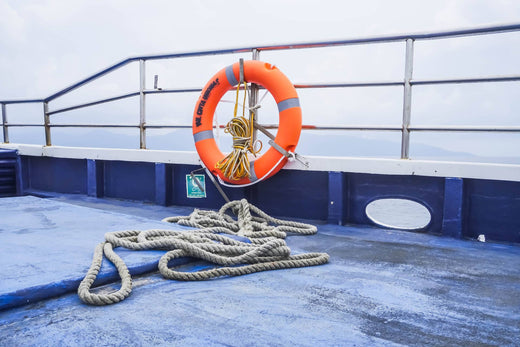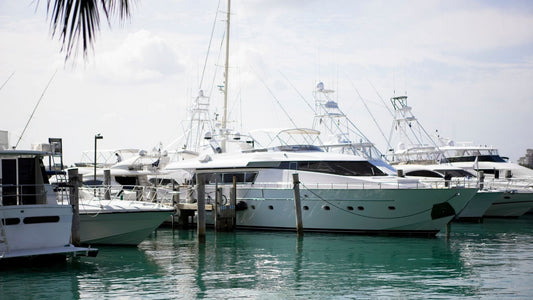
What Tools Should I Keep on My Boat?
Nicholas HeislerShare
If you knew exactly what would go wrong on your future boating adventures, you could keep non-essential items back at home or in your tow vehicle, but — of course — you can’t schedule emergencies.
Still, by knowing that problems are inevitable, you can prepare, and as such, you should have emergency supplies and tools on hand before you go out. You can create your own “essentials kit,” so you don’t have to reference a checklist for every boating session.
Tools You Should Have
Some of the tools below will see regular use, while others will be “just in case” items. Nevertheless, a go-to list of tools includes the following items:
1. Jumper Cables/Portable Jump Starter
You likely have a set of cables in your car; your boat should have them, too. Should you have a battery die while you’re on the water, jumper cables will let you borrow some power from a fellow boater.
If you’re out on the water on your own, though, and you don’t want to wait for rescue, a portable jump starter is a battery you can use to get your boat running again. In any case, purchase quality cables and jump starters that can handle the rigors of marine environments.
2. A Powerful Waterproof Flashlight
Not only will a flashlight be handy if your boating expedition runs past sunset, but it will also allow you to send emergency signals in Morse code, such as the universally recognized “SOS.” Aim to purchase a light with a luminosity of 500 lumens or more so you can easily be seen from far away.
3. Pliers
If you need to make some emergency repairs to an electronic device, you’ll want narrow pliers for fine control. Needle nose pliers can fit into tight spaces and often feature wire cutters. A set of channel lock pliers will transmit more torque and give you a better grip for jobs that emphasize strength over finesse, and locking pliers can make some jobs easier by acting like an extra set of hands to hold items in place.
4. Wrenches and Sockets
You may need to turn some nuts and bolts, so you’ll need a set of wrenches and sockets in the appropriate sizes.
5. Screwdrivers
A comprehensive set of flathead, Phillips head, and even star or torx bits will ensure you can tighten and loosen whatever you need to. A screwdriver with interchangeable bits will keep weight and size down.
6. Scissors and Wire Cutters
From fishing lines to electrical lines, there are plenty of items you’ll need to cut, so you’ll want to have scissors or wire cutters handy.
7. Multi-Tools
When you need a more obscure item, such as a file or small saw, a multi-tool is a great way to access various tools simultaneously.
8. Tape
Keep several kinds of tape on board to cover various scenarios, such as electrical tape, self-amalgamating silicone tape, and duct tape.
9. Zip Ties
In cases where you need to secure lines or cables and adhesive tapes won’t stick, zip ties work wonders.
10. A Tow Line
Should you happen to run out of fuel or break down, you’ll need a way for another boat to pull you back to shore.
11. Spare Bulbs and Fuses
When a bulb or fuse burns out while out on the water in a storm or at night, it can be dangerous. Always carry spares.
12. A Fire Extinguisher
Even though you’re on the water, fire can still pose a threat, and electrical fires, grease fires, and chemical fires won’t react well to water, anyway. A tri-class extinguisher will handle nearly any type of fire you may experience.
13. Drain Plugs
Keep spares on board so that dropping one overboard or leaving some at the dock isn’t a disaster.
14. Goggles and Snorkel
You may have to head underwater to, say, remove a tangled line from your propeller, so being able to see and breathe is undoubtedly essential.
15. A Rigging Knife
Even with a multi-tool, consider a rigging knife, too. It is designed to cut through thick lines quickly, which is what you want to do if a line is pulling your boat in unwanted directions.
The Importance of Being Prepared
Perhaps you’ve sailed out dozens of times with no problems; you’ve been lucky and made it back to shore every time without having to engage in emergency repairs or call for help.
Luck runs out, though, and if you boat long enough, you’re bound to run into some sort of trouble, such as:
- Running out of fuel
- Having an electrical issue that cuts out navigation, radio, etc.
- Springing a leak
- Blowing fuses or bulbs
- Experiencing a major mechanical failure
- Breaking something essential, such as a latch, hose, or handle
- Having to extinguish a fire
These are just a few possible scenarios. In reality, emergencies can take many forms, including some that are truly unexpected, which makes being as prepared as possible a wise move in any scenario.
When it comes to keeping your boat clean, look to Captains Preferred Products boat cleaning supplies. Find everything you need to keep your vessel squeaky clean all season — always at the best prices.




